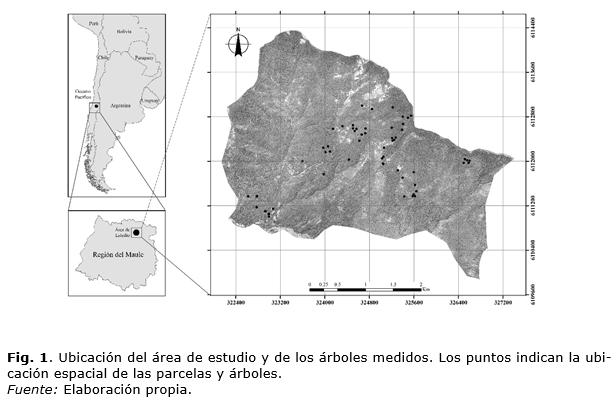Characterization of the Diameter, branch angle and longevity of axial branches of Nothofagusobliqua
Main Article Content
Abstract
The lack of knowledge about grow dynamics of the living tree crown of Nothofagusobliqua secondary growth forests strongly limits the objective formulation of silvicultural schemes oriented to the industrial production of high quality wood. Therefore, in this work, we described basic relationships between tree size, age and angle branches insertion and the crown. Considering a sample data of 59 dominant trees, distributed in different age conditions, we applied a combined analysis technique of stem analysis, steam taper analysis and thickest branch measurement in each decile of the total height. This approach allowed us to determine that there is a significant relationship between the steam diameter, the angle insertion and the age of the branch, as well as the size and age of the trees. Also, the thicker branches tend to have lower insertion angles, to be older, to be located at lower relative heights and to be located in larger diameter sections. Taking into consideration these relationships, it is possible to build new predicted branch models as tools for the development of silvicultural schemes to suit different log grade.
Downloads
Article Details
References
CHANGSHENG, L. et al. Crown morphology of Norway spruce from usual tree measurements. Journal of Forestry Research, 1998, 9(1), 8-12. ISSN: 1007-662X
COLIN, F. Y HOULLIER, F. Branchiness of Norway spruce in northeastern France: predicting the main crown characteristics from usual tree measurements. Annales des Sciences Forestières, 1992, 49(5), 511-538. ISSN: 1286-4560
CORVALÁN, P. Diagrama de manejo de la densidad de rodal para el control del tamaño de ramas basales en bosques septentrionales altoandinos dominados por roble en la región del Maule. Serie biomasa. Santiago, Chile: Facultad de Ciencias Forestales y de la Conservación de la Naturaleza, Universidad de Chile, 2015.
DONOSO, C. Bosques templados de Chile y Argentina. Variación, estructura y dinámica. Ecología Forestal. Santiago, Chile: Editorial Universitaria, 1993.
FORD, E. D. Branching, crown structure and the control of timber production. In Cannell MGR, JE Jackson eds. Attributes of trees as crop plants. Huntingdon, UK: Abbotts Ripton, Institute of Terrestrial Ecology, 1985.
GAJARDO, R. La vegetación natural de Chile. Clasificación y distribución geográfica. Santiago, Chile: Editorial Universitaria, 1994.
GARBER, S. Y MAGUIRE, D. Vertical trends in maximum branch diameter in two mixed-species spacing trials in the central Oregon Cascades. Canadian Journal of Forest Research, 2005, 35(2), 295-307. ISSN: 1208-6037
GROOT, A. y SCHNEIDER, R. Predicting maximum branch diameter from crown dimensions, stand characteristics and tree species. The Forestry Chronicle, 2011, 87(4), 542-551.
GROSSE, H. Y QUIROZ, I. Silvicultura de los bosques de segundo crecimiento de roble, raulí y coigüe en la región centro-sur de Chile. In C. Donoso, A. Lara eds. Silvicultura de los Bosques Nativos de Chile. Santiago, Chile: Editorial Universitaria, 1999. p. 95-128.
GSPALTL, M. et al. Leaf area and light use efficiency patterns of Norway spruce under different thinning regimes and age classes. Forest Ecology and Management, 2013, 288, 49-59.
ISHII, H. Y WILSON, M. E. Crown structure of old-growth Douglas-fir in the western Cascade Range, Washington. Canadian Journal of Forest Research, 2001, 31(7), 1250-1261. ISSN: 1208-6037
KANTOLA, A. Y MÄKELÄ, A. Crown development in Norway spruce [Picea abies (L.) Karst.]. Trees, 2004, 18(4), 408-421. ISSN: 0931-1890
KOZLOWSKI, T.T. Y PALLARDY, S. G. Growth control in woody plants. San Diego, USA: Acadeic Press, 1997.
LARSON, P. R. et al. Formation and properties of juvenile wood in southern pines: a synopsis. USDA Frest Service General Technical Report FPL-GTR-129. Madison, USA: Department of Agriculture, Forest Service, Forest Products Laboratory, 2001.
LOWELL, E. C. et al. Effects of silviculture and genetics on branch/knot attributes of coastal pacific northwest douglas-fir and implications for wood quality—A Synthesis. Forests Science, 2014, 5(7), 1717-1736.
LUEBERT, F. Y PLISCOFF, P. Sinopsis bioclimática y vegetacional de Chile. Chile: Editorial Universitaria, 2006.
MAGUIRE, D.A., KERSHAW, J. A. Y HANN, D. W. Predicting the effects of silvicultural regime on branch size and crown wood core in Douglas-fir. Forest Science, 1991, 37(5), 1409-1428.
MÄKINEN, H. Y COLIN, F. Predicting the number, death, and self-pruning of branches in Scots pine. Canadian Journal of Forest Research, 1999, 29(8), 1225-1236. ISSN: 1208-6037
MÄKINEN, H. Effect of stand density on the branch development of silver birch (Betula pendula Roth) in central Finland. Trees, 2002, 16(4-5), 346-353. ISSN: 0931-1890
NELSON, A.S., WEISKITTEL, A.R. Y WAGNER, R.G. Development of branch, crown, and vertical distribution leaf area models for contrasting hardwood species in Maine, USA. Trees, 2014, 28(1), 17-30. ISSN: 0931-1890
PUNTIERI, J., TORRES, C. Y GHIRARDI, S. Crecimiento y ramificación de Nothofagus alpina y Nothofagus obliqua (Nothofagaceae) bajo diferentes condiciones lumínicas. Growth and branching in Nothofagus alpina and Nothofagus obliqua (Nothofagaceae) under different light conditions. Boletín de la Sociedad Argentina de Botánica, 2013, 48(2), 277-293. ISSN 1851-2372
READ. J. Y HILL, R. Photosynthetic responses to light of Australian and Chilean species of Nothofagus and their relevance to the rainforest dynamics. The New Phytologist, 1985, 101(4), 731-742.
ROEH, R. L. Y MAGUIRE, D. A. Crown profile models based on branch attributes in coastal Douglas-fir. Forest Ecology and Management, 1997, 96(1), 77-100.
RUSSELL, M. B. Y WEISKITTEL, A. R. Maximum and largest crown width equations for 15 tree species in Maine. Northern Journal of Applied Forestry, 2011, 28(2), 84-91. ISSN: 0742-6348.
SONDERMAN, D. L. Quality response of even-aged 80-year-old white oak trees after thinning. Broomall, PA, USA: USDA, Forest Service, Northeastern Forest Experiment Station, 1984.
TRINCADO, G. Y BURKHART, H. E. A model of knot shape and volume in loblolly pine trees. Wood and Fiber Science, 2008, 40(4), 634-646. ISSN: 0735-6161
URI, V. The effect of thinning on the branch diameter increment in pine stands. Baltic Forestry, 1998, 4 (1), 17-23.


